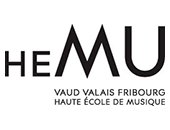Masterclasses
In conjunction with the Geneva and Lausanne Institutions for Higher Education in Music, a Master Class will be held at the end of the Geneva Competition. This event will give some of the competition’s entrants – and some students from the region’s training schools - the opportunity to benefit from the teachings of an internationally renowned artist.
This year the Master Class will be given by Johannes Martin Kränzle, a member of the Voice jury. This brilliant artist, much sought after for the world’s greatest stages, will inspire the young students with his knowledge and experience.
The themes proposed to the participants are Mozart and the German repertoire (Opera, Lied, Oratorio). During three days of classes, they will be able to deepen their understanding of this essential form of lyrical art. As is customary, the Master Class will close with a concert given by the participants on Tuesday 5th December at 6.30 pm. All of the Master Class events, including the teaching day and closing concert, are open to the public.
Public Master Class: 3 - 5 December, from 10AM to 5.30PM, Salle De Agostini
Closing Recital : 5 December, 6.30PM, Salle De Agostini
Young Audience Prize
Like everyone in the world of classical and contemporary music, the Geneva Competition is conscious of today's need to broaden and renew its audience. Touching all segments of the population, this ambition is particularly aimed at young students interested in music. Whether they study at our Conservatories or in a generalist school, they are hereby invited to participate in the Young audience Award, an initiative that has met with much success since its creation in 2012.
Its goal is to train this young audience in critical listening skills, the only guarantee for a lifetime as a committed music-lover. But critical listening of classical music is not the same as the passive listening of music that surrounds us everyday. It means bypassing simple emotions by getting to know the characteristics of the disciplines better (history, technique, etc.) and by focusing on objective criteria similar to those that guide proefssional juries - in a simplified way of course. This approach is used in presentation sessions, where young people can meet music critics and jury members and ask them questions.
University of Geneva, Department of Musicology
The Geneva Competition and the Department of Musicology have become partners with a flexible organisation of plans. At a class given during the automn term at the Department of Musicology entitled "Music and Voice in the 20th Century", Professor Ulrich Mosch will guide students through the recent history of the voice; they will thus discover the enormous variety of ways it has been used in music.
Ulrich Mosch will also take part in a public round table involving jury members and students on the topic of the challenges of "interpreting contemporary vocal music". Finally, the Students' Prize will give musicology students the chance to choose their favourite Voice competition finalist. The same students will post interviews with participants and jury members on our website and social network review pages.
- Music and Voice in the 2oth Century: class every Thursday from 10 am to 12 noon, University of Geneva
- Interpreting Contemporary Vocal Music: round table Thursday 1st December at 6 pm, Conservatory of Music
- Student Prize, given by the University's students
Partnership with the Haute Ecole de Musique - professional workshops
For several years now the Geneva International Music Competition has been participating in professional workshops organised by the Geneva HEM. The aim has been to provide students with the opportunity to meet confirmed professionals, begin a dialogue with them and gain a more precise idea of the realities of life as a professional musician. Within its area of expertise, the Competition can help future professionals to better understand the world of music competitions, the way in which juries and their expectations function, and therefore prepare any musicians wanting to enter.
This year, we have gone one step further by going from theory to reality. The competition invites HEM's students to attend tests in the string quartet competition and then meet members of the jury. A life experience such as this of an international competition - including what goes on behind the scenes - should ensure that at least some misunderstandings and mysteries are cleared up!


